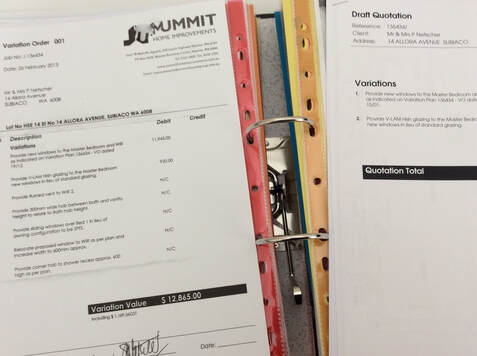Construction projects will have changesConstruction projects, no matter how well they are managed, will inevitably have delays, variations and changes which aren’t due to a fault of the contractor and couldn’t have been expected, allowed for or mitigated by the contractor. Most contract documents allow the contractor to claim the additional time and costs resulting from these events. Are you working for free on your construction project? What happens if clients do not pay for changes and delays which are no fault of the contractorUnfortunately some clients take the approach of not responding to contractor’s variation claims. This is often because the person administering the contract doesn’t want to raise the claim with their manager as it may reflect poorly on their project management skills. Other clients hope that by leaving the claim it may just go away, or that they can take all of the claims at the end of the project, put them in one basket and negotiate a once-off settlement with the contractor – a contractor who at that stage of the contract will be desperate just to get some money from their change order claims. Sometimes clients don’t agree to the contractor’s variation claims because they, in the meantime, are preparing a counter claim against the contractor which they’ll then use to offset the contractor’s claims. This approach is dishonest. Unfortunately most construction contracts specify a time for the contractor to issue a variation claim but very few specify a time by when the client has to respond to the contractor’s claims. This approach is unfair to the contractor since if the claim isn’t approved it won’t be paid, which disrupts the contractor’s cash flow. It also leaves them in limbo not knowing if they’ll be paid at all for the work, which means they could be facing a project loss, which could, in the case of large claims, have a devastating impact on the company. Furthermore, unresolved extension of time claims may mean that the contractor doesn’t complete the project within the original approved time period, thus allowing the client to impose damages or penalties for the late completion. How unfair is that? The contractor has a legitimate extension of time claim and they not only aren’t paid for their costs they incurred as a result of this claim, but, they are further penalized by having to pay damages – all because the client hasn’t responded to their claim! This puts the contractor in a quandary and they aren’t sure if they should accelerate the work (if that’s possible), thus incurring additional costs, but possibly completing the project within the original time and thus avoiding penalties. Of course the contractor hasn’t been instructed to accelerate so they possibly won’t be paid these acceleration costs. It’s important if the contractor decides to accelerate to try and meet the original contract completion date that they advise the client in writing that they are accelerating because the client hasn’t responded to their extension of time claim and is still insisting that the contractor completes the project on the original completion date. This letter should clearly state that there will be additional costs. The contractor needs to keep note of all the additional costs for this acceleration and invoice the client monthly for them. Can I Claim for Additional Time on My Construction Project? Also, as long as claims aren’t resolved there is a risk that the client’s budget may be overspent when the claims are finally resolved which could result in the contractor not being paid for the claims when they are finally agreed. Furthermore, often later variations incurred on the construction project are dependent on attaining a resolution for an earlier claim. As long as the first claims aren’t resolved contractors have to base their later claims on the assumption that their first variation claims were unsuccessful. This becomes messy and when the first claims are eventually agreed it may require the later claims to be reworked taking the earlier delay claim into account, and resubmitted, which takes time and causes confusion. "An excellent, concise and very practical guide to successful claims process. This is a no nonsense approach that gets on with it." Contractors need to make every effort to get their client to resolve their variation claims as soon as possible.Contractors need to make every effort to get their client to resolve their variation claims as soon as possible. Obviously ensuring they have provided all of the supporting information when the claim is first presented is essential and, also, that all of the client’s questions are answered as speedily as possible. It helps if a list of variation claims is included at all project meetings with the client, showing those variation claims which are agreed and those which are still unapproved. This claims register is also an aid for the client so they can adequately monitor their project budget. Will your next construction variation claim be successful? Should the client be unresponsive to variation claims and change orders, letters asking for a resolution need to be submitted. Request a meeting with your client’s representative. In some instance you may be dealing with the client’s engineer or project manager and your client may not even be aware of the unresolved variation claims. In these instances, it may help to bring the problem to the attention of your client and ask for a resolution to the problem. If claims remain unresolved because they aren’t replied to it may be necessary to follow the dispute resolution process outlined in the contract document. 10 Tips To Submit Winning Variation Claims It can pay to consult an expert and get advice on the way forward. In some countries and states there are legal options available and contractors need to be aware of these. Often these options are time dependent and should be instituted as soon as it becomes apparent that the client is going to ignore variation claims. Declaring a dispute with the client over a claim that hasn’t been responded to, often results in a rapid response to the claim. It should be noted that the contractor isn’t entitled to stop work because the client hasn’t responded to a claim – to do so could mean that the contractor is in breach of contract which could allow the client to terminate the contract. Do not ignore unpaid change orders - take actionDon’t let variation claims go unresolved until the end of the construction project since you risk not being paid the claim. Negative cash flow – the death for many construction companies This article was first published on the ClockShark website - Get The Industries' #1 Time-Tracking AppRunning a field service or construction business takes coordination and a great team. With ClockShark you get the industries' #1 timesheet ap Learn more about Construction Project ManagementTo read more about the author’s books and find out where you can purchase them visit the pages on this website by clicking the links below: 'Successful Construction Project Management: The Practical Guide' 'Building a Successful Construction Company: The Practical Guide' 'Construction Claims: A Short Guide for Contractors' 'Construction Project Management: Tips and Insights' 'Construction Book reviews' To read more about the author visit the page 'Paul Netscher' Want to contact Paul Netscher please enter your details on 'Contacts' Find out how Paul Netscher can help you Order your books from Amazon Order your books from Amazon UK © 2016 This article is not to be reproduced for commercial purposes without written permission from the author. "A MUST Read for any Construction Professional to raise their game! " construction management construction project management
0 Comments
Leave a Reply. |
Archives
June 2024
Note: We welcome genuine comments, especially comments that add additional information to the subject matter in the article. We however reserve the right to remove inappropriate comments, which includes comments that have nothing to do with the subject, comments that include inappropriate language, and comments that are an advertisement for a product or company, or which include an advertising link. Comments must be in English. We will not enter into discussion on why a particular comment was removed.
CategoriesCopyright 2016 - The attached articles cannot be reproduced for commercial purposes without the consent of the author.
The opinions expressed in the attached articles are those of the writer. It should be noted that projects are varied and different laws and restrictions apply which depend on the location of the contractor and the project. It's important that the reader uses the supplied information taking cognisance of their particular circumstances. The writer assumes no responsibility or liability for any loss of any kind arising from the reader using the information or advice contained herein. "I have what I consider some of the best books on construction management."
Books are available from: Amazon.com Amazon.co.uk takealot.com kalahari.com Amazon.in Amazon.de Amazon.fr Amazon.it Amazon.com.au Powell's Fishpond uread bokus Amazon.ca Amazon.es Other retail stores Available in paperback or on Kindle "28 YEARS OF CONSTRUCTION PROJECT MANAGEMENT EXPERIENCE, DEVELOPING SUCCESSFUL CONSTRUCTION PROJECT MANAGERS AND BUILDING SUCCESSFUL CONSTRUCTION COMPANIES"
|







 RSS Feed
RSS Feed




